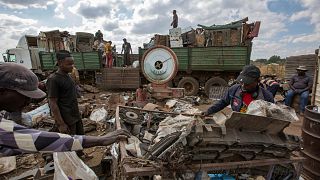Zimbabwe
The Ndebele family has been waiting to hear from their main breadwinner for months; but nothing has been heard.
The family is one of the many families living in Bulilima districts in the Matebeleland south province affected by a severe drought.
Hundreds of young people have fled increasing hardship to seek employment outside the country, as farm labourers in neighbouring South Africa and Botswana.
Seventy nine-year-old Solomon Ndebele and his wife are forced to rely on donations to feed their grandchildren.
“Our son went to Botswana last year and never sent anything back home for the kids. After a while his wife ran away because there was not support.” he said.
Southern Africa has been hard hit over the past year by drought caused by El Nino, a warming of sea surface temperatures in the Pacific Ocean.
The U.N World Food Programme estimates around 4 million people — one in three Zimbabweans are struggling to meet their basic food needs.
“As parents migrate outward into Botswana or South Africa, they leave their children in the care of their grandparents who are also unable to fend for their children thus giving us a serious challenge in terms of providing for the children.” Bulilima district, social services officer, Sifiso Dube.
The government is struggling to keep spending on its social programmes. So far it has been providing Ndebele and thousands of households 50 kilogramme maize bags per month which many say are inadequate.













01:15
Morocco says 2024 was the hottest year with temperatures reaching 47.7 degrees
01:18
Gaza Crisis: Water shortages worsen
03:46
With 500 species, Moroccan exotic garden an oasis of biodiversity
03:52
Amid drought, King urges Moroccans not to kill sheep for Eid al-Adha
04:00
Consecutive droughts Impact Morocco's livestock, reports Minister of Agriculture
02:09
In Goma, a drinking water shortage is exacerbating tensions